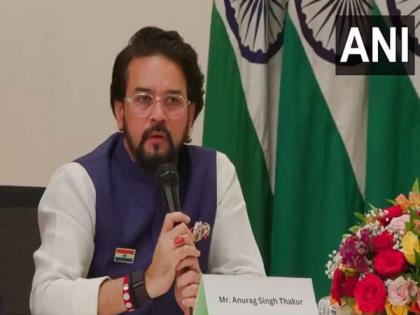"No society, no govt will accept any form of terrorism": Anurag Thakur in Ethiopia
By ANI | Updated: June 1, 2025 23:08 IST2025-06-01T23:03:35+5:302025-06-01T23:08:09+5:30
Addis Ababa [Ethiopia], June 1 : BJP MP Anurag Thakur, member of the all-party delegation led by NCP-SCP Supriya ...

"No society, no govt will accept any form of terrorism": Anurag Thakur in Ethiopia
Addis Ababa [Ethiopia], June 1 : BJP MP Anurag Thakur, member of the all-party delegation led by NCP-SCP Supriya Sule noted that no society, no government will accept any form of terrorism. This visit is a part of Modi government's big diplomatic outreach following Operation Sindoor.
"I think all the meetings we had, starting with the former Prime Minister to the Speaker of the Assembly, Deputy Prime Minister to the leaders of various political parties and the member of Parliament, one thing we have seen that the special significant and the historic ties between India and Ethiopia goes in the favor. We are on the same page as far as zero tolerance against terrorism is concerned," Thakur told ANI.
He also rebuked Pakistan for it state-sponsored terrorism which emanated from its soil.
"No society, no government will accept any form of terrorism. No terrorism is good or bad, terrorism is terroris...In India, it is state-sponsored terrorism which emerged from the soil of Pakistan. They are being given shelter there, financing, training, logistics, handling and post-attack also, when you give enough proof to them, Pakistan don't take action on them. That is the challenge we face..."
Meanwhile, BJP leader V Muraleedharan also highlighted the issue of state-sponsored terrorism, particularly in relation to India's neighbor, Pakistan. Muraleedharan stated, "For us in India, one major issue is that our neighbour, since its inception, has been to encourage, train and finance those elements who want to create problems and terror in the territory of India."
"We see terrorism as a global phenomenon, but mostly by non-state players...A country has made terrorism their state policy, which is the biggest threat that the world is facing now. It's not an allegation by India, but it is a fact that has been very specifically mentioned, recorded and documented by the UN Security Council Sanctions Committee," he added.
After interacting with the Indian Delegation, Civil Society Member from Addis Ababa, Bilen expressed appreciation for the Indian delegation's. Bilen stated, "The Indian delegation well explained the current situation as well as the future plans... Explaining one's side of the situation clears misunderstandings and therefore I think whatever they are doing is very good."
The Supriya Sule-led delegation is in Ethiopia. The delegation includes Rajiv Pratap Rudy (BJP), Vikramjit Singh Sahney (AAP), Manish Tewari (Congress), Anurag Singh Thakur (BJP), Lavu Sri Krishna Devarayalu (TDP), Anand Sharma (Congress), V Muraleedharan (BJP), and former diplomat Syed Akbaruddin.
The delegation had arrived at Bole International Airport in Ethiopia on Friday, where they were received and welcomed by the Ambassador of India to Ethiopia, Anil Kumar Rai.
Recently, the delegation concluded its diplomatic visit to South Africa with a series of meetings at India House in Pretoria, the administrative capital of South Africa, involving political leaders, think tanks, and the Indian diaspora.
The delegations aim to brief international partners on India's response to the April 22 Pahalgam terror attack and its fight against cross-border terrorism.
The seven delegations are visiting Saudi Arabia, Kuwait, Bahrain, Algeria, the UK, France, Germany, the EU, Italy, Denmark, Indonesia, Malaysia, Korea, Japan, Singapore, the UAE, Liberia, Congo, Sierra Leone, the US, Panama, Guyana, Brazil, Colombia, Spain, Greece, Slovenia, Latvia, Russia, Egypt, Qatar, Ethiopia, and South Africa.
Operation Sindoor was launched on May 7 as a decisive military response to the April 22 Pahalgam terror attack by Pak-sponsored terrorists in which 26 people were killed. Indian Armed Forces targeted terror infrastructure in Pakistan and Pakistan-occupied Jammu and Kashmir, leading to the death of over 100 terrorists affiliated with terror outfits like the Jaish-e-Mohammed, Lashkar-e-Taiba, and Hizbul Mujahideen.
Disclaimer: This post has been auto-published from an agency feed without any modifications to the text and has not been reviewed by an editor
Open in app
